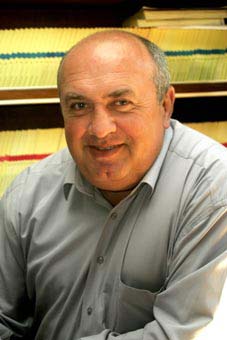The evolutionary way to address revolutionary problems
By Temuri Kiguradze
Wednesday, October 7

“Georgian law underwent its first and most important reform back in 1998; ten years ago significant changes were made to both the civil and criminal codes of Georgia. The most important of these was the establishment and real implementation of the adversarial method of conducting court cases. This reform was quite successful and hailed by legal experts in the international community,” stated Svanidze.
However he also noted that not everything was perfect in the reform as “a lot of judges and lawyers were not psychologically ready for the new system,” and the corruption level also had a big role in slowing down the reform. “As with all reforms in independent Georgia this one was in a way superficial and it clearly needed a lot more time for the changes to implemented,” stated the lawyer.
Svanidze, whose professional practice has lasted for 15 years, stated that the situation radically changed after the Rose Revolution in 2003. “Nothing was kept from the good start of 1998-99, the law system became monopolised and it became obvious that the reforms had failed.” Svanidze noted that this “monopolisation” should not have been allowed to happen as “despite any good purpose it may serve it doesn’t work to leave justice without freedom.
“The revolutionary charge was very strong in 2004, it was so strong that it has affected and ruined the legal system in Georgia. Government policy has significantly lowered the quality of investigations and the courts and they have nothing more left to do than to fulfill the orders of the authorities. So called “TV justice” has also played a role in this process, as many officials and businessmen [from the period of the previous Government] have been detained in front of the TV cameras, and no judges have been able to resist pressure and ensure due process for a person already judged by public opinion. Those who had done so would have risked their status and even freedom, as detentions of judges were not rare back in those days,” Gocha Svanidze said, adding that the Government was also fulfilling “a public order” by arresting and sentencing people who had gained their fortune and position during the previous, corrupt Government.
“And this process is irreversible: once a judge fulfils the order of the Government he will never stop, as it is hard to believe in the sincerity of the authorities despite the fact that some of them now already feel sorry for ruining the system. Furthermore, a new generation of lawyers and judges has appeared on the scene, appointed for one main reason – their dedication to the Government.
“These events have shown that revolution is deadly for the Georgian court system and a new revolution could only destroy justice in Georgia. The only way we have left is step-by-step evolution, in which legal professionals do their duty despite the obstacles placed before them. That may change the situation, however this process is slow and the first results can only be gained several years after the process has started,” noted Svanidze, adding that “if earlier I thought that we should preserve at least some results of the 98-99 reform, now I can see that that reform process is dead and we have to start all over again.”
Svanidze considers that the association he now leads should play the fundamental role in the establishment of an independent legal system in Georgia. “We are the only organisation which certifies lawyers in Georgia. If someone wants to be an attorney he should obtain our certification and agree to the code of ethics accepted in our Association. We unite more than 4,000 lawyers from all over Georgia,” stated the acting head of the Georgian Bar Association. He also noted that this process “is unacceptable for the clever enemies of the independent court system.” “An organisation which unites professionals and seeks the improvement of the justice system in Georgia may play a significant role in ensuring the statehood of the country,” concluded Svanidze.
